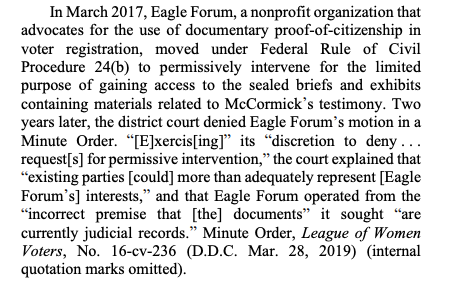D.C. Circuit Review – Reviewed: A Bad Week for the DDC
It is often said that the D.C. Circuit is the nation’s second most important court — a topic I’ve addressed before. But if so (and it is very debatable), what does that make the United States District Court for the District of Columbia? Is the “DDC,” by operation of the transitive property, somehow the most important trial court in America? No doubt judges in Manhattan, Marshall, Delaware,* and San Francisco would scoff at the idea. Yet it might be so. It is hard to deny that the DDC decides many important cases.
The DDC, however, is subject to review by the D.C. Circuit. And as sometimes happens to everyone, this was a bad week for the DDC.
The D.C. Circuit decided four cases this week. Each came out of the DDC (i.e., there was no direct agency review). There was only one affirmance — United States v. Lieu (per Judge Katsas, joined by Judges Rogers and Griffith), in which the D.C. Circuit agreed with the DDC that a defendant can violate federal law against “distributing child pornography and traveling across state lines to engage in sexual conduct with a nine-year-old girl” even if the targeted child “was in fact an FBI fabrication.”
So let’s look at the other three cases. League of Women Voters v. Newby (per Judge Tatel, joined by Judges Garland and Millett) is interesting because the case doesn’t involve the League of Women Voters at all: “Despite the caption — League of Women Voters of the United States v. Newby — this appeal is a dispute between Eagle Forum Education & Legal Defense Fund, the aspiring intervenor, and the federal government, which opposes its intervention.” The main case is a fight over “documentary proof of citizenship” for ballots. This appeal, however, is about intervention:

The D.C. Circuit didn’t buy it. The United States did not defend the district court’s conclusion that “Eagle Forum’s interests are adequately represented by existing parties.” And the D.C. Circuit has already held that “every brief filed to influence a judicial decision qualifies as a ‘judicial record.'” Hence, reversal. (For what it is worth, the most important part of this opinion may be the discussion of the collateral-order doctrine.)
Next consider Make The Road New York v. Wolf. In this case, the panel majority (Judge Millett, joined by Judge Edwards) and panel dissent (Judge Rao) vigorously disagreed with each other — about why the district court should be reversed! Here is a quick version of the story. Last year, the Department of Homeland Security expanded the reach of its expedited removal process. The district court preliminarily enjoined that expansion. Judge Millett concluded that there was federal jurisdiction but that this issue is committed to agency discretion by law in light of the Secretary’s “sole and unreviewable discretion” under the statute. Millett also held that the Secretary need not use notice-and-comment procedures because, inter alia, the Secretary can modify the expansion designation “at any time.” Judge Rao dissented because there was no federal jurisdiction to begin with since, in her view, the statute “expressly bars the courts from reviewing the Secretary’s discretionary decisions regarding expedited removal.” (Note: This is an important case for a bunch of reasons. It addresses the strength of the presumption of reviewability, when something is committed to agency discretion by law, when a commitment of a substantive issue to agency discretion also cancels out the need for notice-and-comment procedures (which issue merits a student note), and even nationwide injunctions. You should definitely read both the majority and the dissent.)
Finally, we have In re Flynn — which is a successful mandamus case (you don’t see that every day). Unless you’ve been living under a rock, you know the facts of this case. Suffice it to say, the Court (Judge Rao, joined by Judge Henderson), applying United States v. Fokker Services BV, 818 F.3d 733 (D.C. Circuit), ordered the district court to grant Flynn’s unopposed motion to dismiss and vacate the district court’s appointment of an amicus. That’s strong medicine. The Court, however, did deny Flynn’s petition to reassign the judge. Judge Wilkins dissented, arguing that the majority overstepped its own power. This case was decided earlier this week and lots (and lots and lots) of folks have already written about it. So I’ll leave it at that.
* I don’t believe that the Chancery Court does jury trials. But it’s still a trial court.
D.C. Circuit Review – Reviewed is designed to help you keep track of the nation’s “second most important court” in just five minutes a week.



